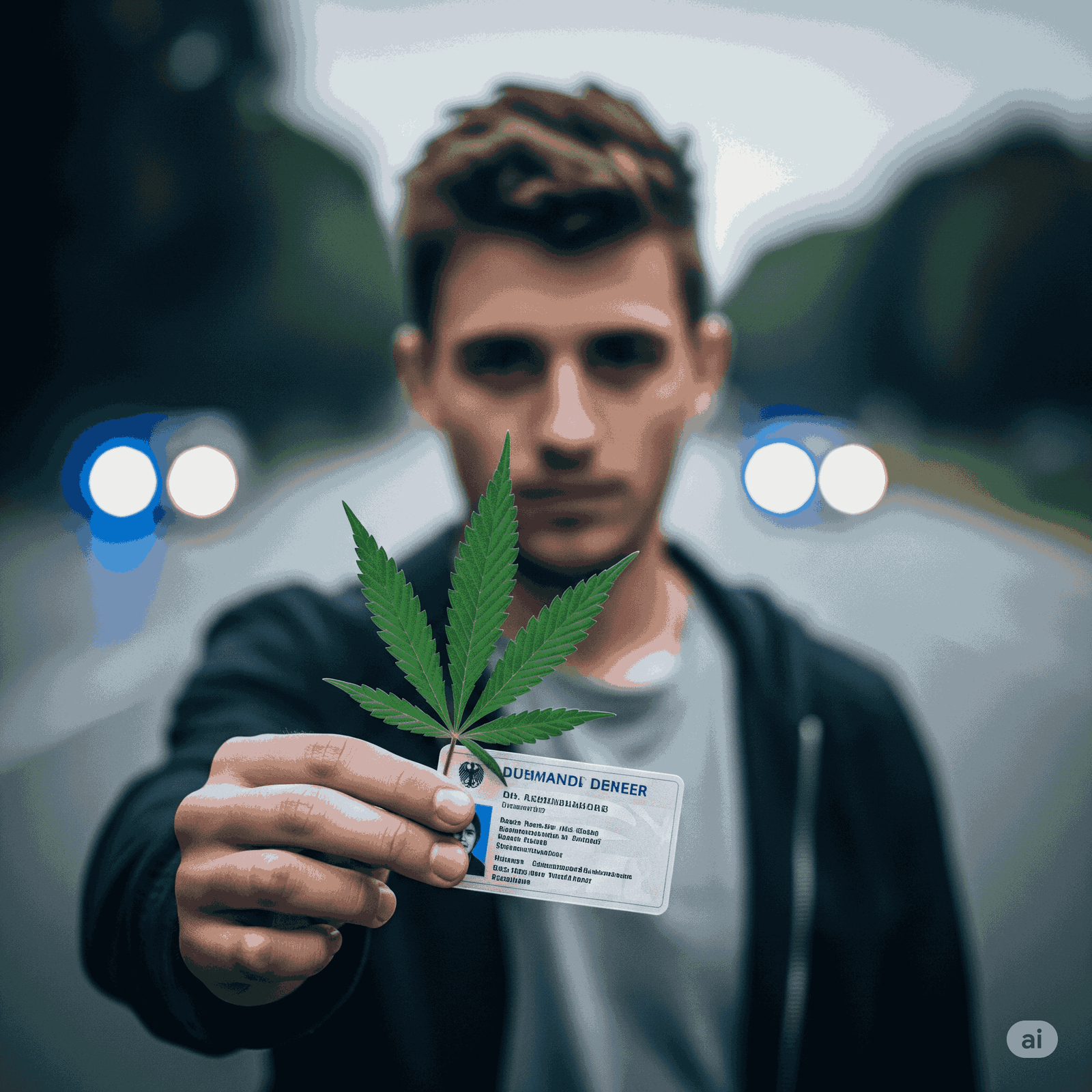-
أخر الأخبار
- استكشف
-
المدونات
-
المناسبات
Occasional Cannabis Use and Driving in Germany – The Legal Reality vs. Public Perception

How “Gelegentlicher Konsum” Can Still Lead to MPU and License Suspension
This blog explores the murky legal waters surrounding occasional cannabis use in Germany, especially in relation to driving license suspension and MPU mandates. With analysis of case law, toxicology standards, and real-life examples, we expose the gap between perception and legal interpretation — and explain how to legally protect yourself.
Many drivers in Germany assume that occasional cannabis use (gelegentlicher Konsum) is harmless when it comes to driving. But legal systems don’t always align with that belief. This blog breaks down how German law interprets cannabis use in traffic law, what counts as “occasional,” and when a MPU (Medical Psychological Assessment) is required — even without intoxicated driving.
1. The Myth: “If I’m Not High, I’m Not Breaking the Law”
Many cannabis users assume that as long as they’re not actively high while driving, they’re safe from legal repercussions. This belief is dangerously outdated.
In Germany, THC can remain detectable in the bloodstream for days after use, and driving even with residual levels can result in:
-
License suspension
-
Mandatory MPU
-
Fines and penalties
Even “gelegentlicher Konsum” [occasional use] can lead to consequences if proper separation between consumption and driving isn’t proven.
2. What the Law Says: Cannabis and §24a StVG
According to §24a StVG (Straßenverkehrsgesetz):
-
Driving with even trace amounts of THC can lead to a fine and driving ban.
-
If THC-COOH (a cannabis metabolite) is detected above 1 ng/ml, it often triggers administrative action.
The assumption: Any presence of THC implies risk, unless the driver proves no impact on ability to drive safely.
3. What “Gelegentlicher Konsum” Really Means in Law
Legally, “gelegentlicher Konsum” is defined as:
-
Non-daily consumption
-
No dependency
-
Not combined with driving
But proving this is difficult.
Authorities look for:
-
Clear separation between consumption and driving
-
Abstinence evidence or stable consumption patterns
-
No signs of cannabis influencing driving behavior
Even occasional users face MPU if:
-
They are caught with THC in blood during a traffic check
-
No documentation exists to prove controlled behavior
-
They lack psychological assessments or abstinence tests
4. Case Example: The Friday Night Joint and Monday Morning Commute
A 29-year-old man in Munich smoked a joint Friday night and drove to work Monday morning. He was stopped for a random check. THC detected: 2.1 ng/ml.
His argument: “It was days ago. I wasn’t impaired.”
But legally:
-
Presence of THC triggered license suspension
-
He was ordered to complete an MPU
-
He needed to prove gelegentlicher Konsum with documented history
Without legal or psychological preparation, he failed the first MPU and lost his license for over 18 months.
5. Medical Realities vs. Legal Standards
THC behaves differently than alcohol in the body:
-
Alcohol clears in hours
-
THC stores in fat cells and releases slowly
-
Long detection time doesn’t mean the user is still impaired
But German courts apply strict liability:
If THC is present, the law assumes risk, regardless of actual impairment.
6. MPU Implications for Cannabis Users
MPU is almost always triggered if:
-
You're caught driving with THC in your blood
-
Your usage patterns suggest regular or unregulated use
-
You don’t show awareness of responsibility
To pass MPU, cannabis users must:
-
Prove abstinence (6-12 months)
-
Provide lab results (hair/urine)
-
Undergo psychological assessment
-
Reflect on behavior in a genuine and convincing manner
Even gelegentlicher Konsum is enough to require these steps.
7. How a Verkehrsrecht Anwalt Can Help
A skilled verkehrsrecht anwalt [traffic law lawyer] can:
-
Challenge the legality of the drug test
-
Investigate if the stop was lawful
-
Assess whether MPU was truly necessary
-
Help craft a strategic abstinence plan
In some cases, the lawyer may even prevent MPU from being required, especially if the THC level is borderline and there's no record of impairment.
8. Psychological Evaluation and Proof of Responsibility
Even occasional users must show:
-
Introspective understanding of the risks
-
Behavioral control and a plan to avoid future situations
-
Change in lifestyle to separate cannabis use and driving permanently
The psychological interview is less about usage and more about self-awareness.
Sample questions include:
-
Why do you use cannabis?
-
Have you ever driven after consuming?
-
How will you ensure it won’t happen again?
9. Abstinence Testing – What Counts?
You must prove abstinence through:
-
Urine screenings (6 tests over 6 months)
-
Hair analysis (3 cm = ~3 months)
-
Must be done in certified labs with documentation
Failing to use the right lab or missing one test can make all previous tests invalid.
10. Public Misunderstanding: “Everyone Smokes, So It’s Fine”
Another misconception is that because cannabis use is rising (and partially legalized), the legal system is more lenient.
In fact, the opposite is true:
-
Tolerance is low when it involves road safety
-
Law enforcement actively tests for THC
-
Courts uphold strict penalties
Until laws officially change, drivers must treat cannabis like any impairing drug.
Final Takeaways: Think Before You Light Up
Even if you only smoke occasionally, remember:
-
THC remains in your body longer than you think
-
The legal system does not care about your intent—only your blood results
-
A simple joint could lead to months of suspension and MPU costs
If you use cannabis, the safest legal choice is:
Don't drive for at least 72 hours after consumption — or better, prove abstinence if you want to keep your license.




